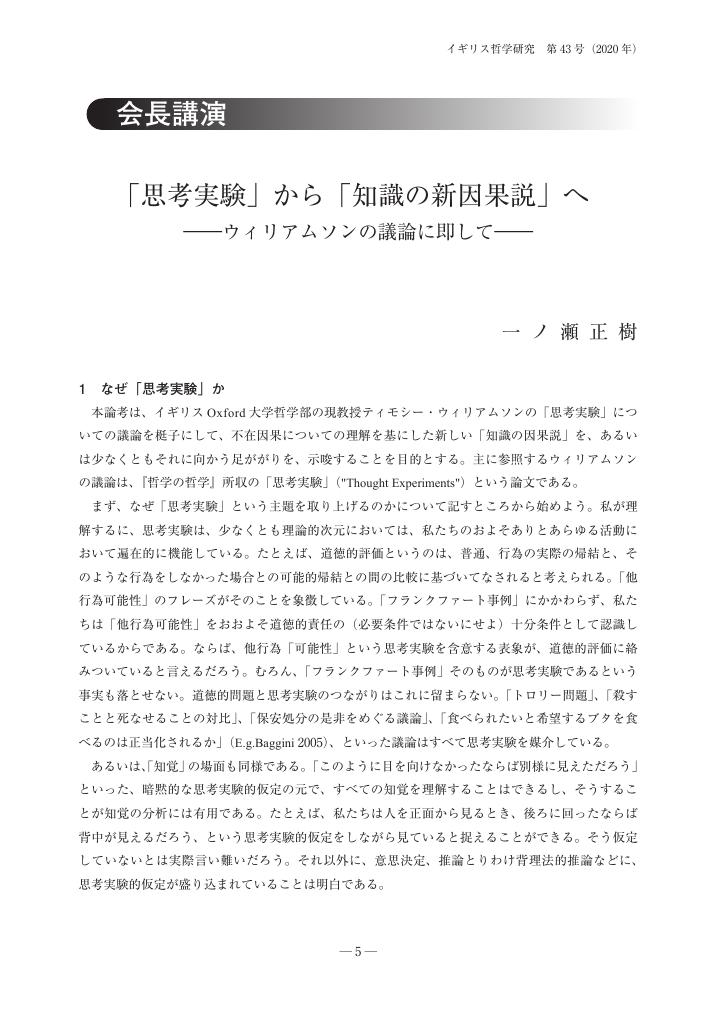7 0 0 0 OA 歴史認識における因果と確率
- 著者
- 一ノ瀬 正樹
- 出版者
- 日本哲学会
- 雑誌
- 哲学 (ISSN:03873358)
- 巻号頁・発行日
- vol.2005, no.56, pp.42-62,3, 2005-04-01 (Released:2009-07-23)
- 参考文献数
- 26
The past is nowhere, but it is implied in our understanding of the world. We have to take into account these two fundamental characteristics of the past, i.e. absence and im-plicitness, in order to clarify historical knowledge, as history must be a part of the past highlighted by linguistic description. In this article I investigate the nature of historical knowledge by taking implicitness of the past to be causation between the past and our present state, and interpreting absence of the past as bringing about a probabilistic character of historical knowledge.After briefly examining the controversy about the reality of the past, I scrutinize the covering law model of historical causal explanation through considering its probabilistic form. In particular I mention the problem of how to apply Bayesian Conditionalisation to historical causal explanations. However, Bayesian theory is involved in serious difficulties like the problem of old evidence. This suggests that our choice of context must be ques-tioned, which calls the narrative theory of history into discussion. I argue that narrative theory will introduce backward causation from narration to past events, and that the theory will still imply a probabilistic contingent status of the past. Finally I take up the question of why we narrate our history, and I assert that a sense.of crisis causally motivates us to narrate it. As the sense of crisis itself is a sort of historical knowledge as well as the resultant narration, the probabilistic and contingent character extends throughout our historical knowledge.
4 0 0 0 OA 日本における低線量被曝論争の構図
- 著者
- 一ノ瀬 正樹
- 出版者
- 東京大学大学院人文社会系研究科グローバルCOEプログラム「死生学の展開と組織化」
- 雑誌
- 死生学研究 (ISSN:18826024)
- 巻号頁・発行日
- vol.17, no.S1, pp.38-58, 2012-03-20
日台国際研究会議「東アジアの死生学へIV」, 2011年10月7日, 国立中山大学社会科学院, 高雄
3 0 0 0 OA 「信念の倫理」研究序説
- 著者
- 一ノ瀬 正樹
- 出版者
- 武蔵野大学教養教育リサーチセンター
- 雑誌
- The Basis : 武蔵野大学教養教育リサーチセンター紀要 = The Basis : The annual bulletin of Research Center for Liberal Education, Musashino University (ISSN:21888337)
- 巻号頁・発行日
- no.11, pp.29-46, 2021-03-01
3 0 0 0 OA 書評
2 0 0 0 OA ヒュームと同一性の問題
- 著者
- 一ノ瀬 正樹
- 出版者
- 日本イギリス哲学会
- 雑誌
- イギリス哲学研究 (ISSN:03877450)
- 巻号頁・発行日
- vol.9, pp.15-24, 1986-04-01 (Released:2018-06-25)
1 0 0 0 OA 海外部会報告
- 著者
- 一ノ瀬 正樹
- 出版者
- 日本イギリス哲学会
- 雑誌
- イギリス哲学研究 (ISSN:03877450)
- 巻号頁・発行日
- vol.43, pp.153-155, 2020-03-20 (Released:2021-04-16)
1 0 0 0 OA 「思考実験」から「知識の新因果説」へ ―ウィリアムソンの議論に即して―
- 著者
- 一ノ瀬 正樹
- 出版者
- 日本イギリス哲学会
- 雑誌
- イギリス哲学研究 (ISSN:03877450)
- 巻号頁・発行日
- vol.43, pp.5-21, 2020-03-20 (Released:2021-04-16)
- 参考文献数
- 16
1 0 0 0 OA 書評
1 0 0 0 OA 書評
1 0 0 0 OA 書評
1 0 0 0 OA 書評
1 0 0 0 OA 死の害についての「対称性議論」をめぐって : 因果概念に照らしつつ
- 著者
- 一ノ瀬 正樹
- 出版者
- 武蔵野大学教養教育リサーチセンター
- 雑誌
- The Basis : 武蔵野大学教養教育リサーチセンター紀要 = The Basis : The annual bulletin of Research Center for Liberal Education, Musashino University (ISSN:21888337)
- 巻号頁・発行日
- no.9, pp.105-125, 2019-03-01
1 0 0 0 功利主義と分析哲学 : 経験論哲学入門
現代のように多様な価値観や情報が溢れる時代においては、我々の実践的文脈を離れた理性の明証性に訴えるような(通俗的な)個人主義的啓蒙思想は説得力を欠く。個人主義的啓蒙思想の理念に訴えるのでもなく、また権威に盲従するのでもなく、我々の実践に根差した形で思考し行為することの意義を徹底的に考える哲学としての常識哲学は、今日ますますその重要性を高めている。本研究の目的は、これまで十分に検討されてこなかったこの常識哲学の展開を哲学と思想史の両面から明らかにし、その洞察と限界を見極めるとともに、それを通して現代の我々が様々な問題について思考する際に常識の果たすべき役割を明らかにすることである。
- 著者
- 田坂 さつき 島薗 進 一ノ瀬 正樹 石井 哲也 香川 知晶 土井 健司 安藤 泰至 松原 洋子 柳原 良江 鈴木 晶子 横山 広美
- 出版者
- 立正大学
- 雑誌
- 基盤研究(B)
- 巻号頁・発行日
- 2019-04-01
本研究は、日本学術会議第24期連携会員哲学委員会「いのちと心を考える」分科会委員のうち9名が参画し、同分科会委員長田坂さつきを研究代表者とする。本研究には、政府が主催する会議などの委員を歴任した宗教学者島薗進、倫理学者香川知晶に加えて、医学・医療領域の提言のまとめ役でもあり、ゲノム編集による生物医学研究の黎明期から先導的に発言してきた石井哲也も参画している。医学・医療領域におけるゲノム編集に関する提言に対して、哲学・倫理の観点からゲノム編集の倫理規範の構築を目指す提言を作成し、ゲノム編集の法規制の根拠となる倫理的論拠を構築することを目指す。
1 0 0 0 IR 「死ぬ権利」の欺瞞
- 著者
- 一ノ瀬 正樹
- 出版者
- 東京大学グローバルCOEプログラム「死生学の展開と組織化」
- 雑誌
- 死生学研究 (ISSN:18826024)
- 巻号頁・発行日
- no.1, pp.36-68, 2003-03-25
1 0 0 0 ヒトと動物の死生学 : 犬や猫との共生、そして動物倫理
- 著者
- 一ノ瀬正樹 新島典子編
- 出版者
- 秋山書店
- 巻号頁・発行日
- 2011
1 0 0 0 OA 報告
- 著者
- 一ノ瀬 正樹
- 出版者
- 東京大学グローバルCOEプログラム「死生学の展開と組織化」
- 雑誌
- 死生学研究 (ISSN:18826024)
- 巻号頁・発行日
- vol.6, 2005-10-25 (Released:2009-03-09)
国際シンポジウム「生死をめぐる同意と決定」
1 0 0 0 西洋哲学史全体の統一的理解に関する研究
- 著者
- 岡崎 文明 一ノ瀬 正樹 小浜 善信 伊集院 利明 谷 徹 榊原 哲也 杉田 正樹 日下部 吉信 須藤 訓任 赤井 清晃 柏端 達也 塩路 憲一 古田 智久 三浦 要 菊地 伸二
- 出版者
- 金沢大学
- 雑誌
- 基盤研究(B)
- 巻号頁・発行日
- 1999
本研究の課題は<西洋古代から現代に至る二千六百年に及ぶ哲学史の統一的理解・再構築は可能か?>である。我々は共同研究を通じて再構築は可能であると結論することができた。これは「実存的歴史観」(vde.渡邊二郎『歴史の哲学-現代の思想的状況-』講談社、1999)によって支えられる。その具体的な姿は本研究グループの各メンバーによって各に示される。研究代表者の見解を要約すれば、西洋哲学史には2伝統、即ち古代ギリシア哲学(=ヘレニズム=善の優位性の思想)の伝統と西洋中世以降の哲学(=ヘブライズム=存在の優位性の思想)の伝統とが存存する。両伝統における「万有の根源の解釈」は根本的に異なる。しかし両者は新プラトン主義(原型)の第2段階「存在者-生命-知性」(三一)を或る仕方で共有することによって相互影響を受け、中世以降に新たな思想を生む。その結果、中世では存在論が、近世では認識論が、現代では生命論、新たな認識論と存在論がそれぞれ中心となった新しい哲学生まれる。中世から現代に至る諸哲学は1セットとして、ギリシア哲学に対峙し得る。その内容は下記の研究成果に示される。我々の研究成果の一部はまず第1の共同研究成果論文集『西洋哲学史の再構築に向けて』(1999)に示される。この外にもメンバー21人の各の研究論文等においても示される。その成果総数は学術論文209本、國内外の学会・研究会口頭発表87回、図書(単著)9冊である。更に平成15年中に第2の共同研究成果論文集『西洋哲学史観と時代区分』を公刊しようとしている。続く第3の共同論文集『現代の哲学-二千六百年の視野において-』は平成15年度科学研究費補助金(研究成果公開促進費)に申請中である。さらに第4の共同論文集『西洋哲学史再構築試論』も平成16年度科究費(研究成果公開促進費)に申請する予定である。以上が研究成果概要である。










